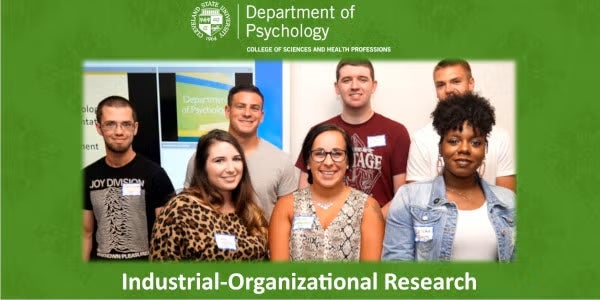Psychology
Contact Info
Mailing Address
Cleveland State University
Dept. of Psychology
2121 Euclid Ave., PSY
Cleveland, OH 44115-2214
Campus Location
Union Building 7th Floor (UN)
1836 Euclid Avenue
Cleveland, OH 44115
Contact Us
Phone: 216.687.2544
Email: psychology@csuohio.edu
Industrial-Organizational Research

Master of Arts Degree
Program Overview
The Industrial-Organizational Research specialization prepares students to conduct applied research in business and organizational settings. Students acquire a solid foundation in statistics and research methods that can be applied across a wide range of environments. Students gain a background in contemporary psychological theories, and are equipped with the analytic tools necessary for effective problem-solving in applied settings, as well as the development of innovative research. Students learn how to apply psychological and research principles to develop understanding and skill in job analysis, personnel recruitment and selection, performance management, training design, employee motivation, job satisfaction, leadership, teamwork, and organizational climate.
This specialization is designed to be completed in two years and culminates with a thesis or research project. While it is expected that all students will have the opportunity to participate in the solution of actual problems under the guidance of faculty, selected students also have the opportunity for field placements in business settings.
| CSU's i-o Research Program will not be accepting applications for Fall 2023 and beyond |
|---|
*Please see the bottom of the Opportunities page for info about other programs outside of CSU*
Program Requirements
The Industrial-Organizational Research specialization requires 39 semester credit hours of coursework and research or field experience. The first year of study typically consists of courses in statistics, research methods, and courses related to the discipline. This work is continued into the second year, where students take additional elective courses and work on a thesis or research project. Further, during the second year students are encouraged to take part in an internship in a business setting relevant to their primary area of interest.
Content Requirements (three of the following courses)
- PSY 518 Personnel Psychology (3)
- PSY 522 Organizational Psychology (3)
- PSY 631 Job Analysis and Performance Management (3)
- PSY 593 Advanced Organizational Psychology (3)
Methodological Requirements
- PSY 511 Univariate Statistics (4)
- PSY 512 Research Methodology (3)
- PSY 611 Advanced Data Analysis (4)
Research Requirements
- PSY 699 Research and Thesis (4) or PSY 596 Special Problems in Psychology (4)
- A committee consisting of graduate faculty must review and approve a student's thesis proposal or research project (for non-thesis students) before they can sign up for thesis credits or special problems.
Electives (at least 15 credits from the following list)
- PSY 518 - Personnel Psychology
- PSY 519 - Consumer Psychology
- PSY 522 - Organizational Psychology
- PSY 525 - Social Psychology
- PSY 562 - Learning, Memory, and Cognition
- PSY 590 - Industrial and Organizational Psychology Internship
- PSY 593 - Special Topics In Psychology
- PSY 596 - Special Problems in Psychology
- PSY 630 - Diversity Issues in Human Resources
- PSY 631 - Job Analysis and Performance Management
- PSY 672 - Multicultural Psychology and Diversity Practicum
- MGT 640 - Total Rewards, Compensation and Benefits
- MKT 501 - Marketing Management
- MKT 531 - Marketing Research
- MKT 601 - Marketing Strategy
- MKT 608 - Global Marketing
Other courses in Marketing, Operations Management and Business Statistics, Management and Labor Relations, Communication, and Psychology are possible for elective credit, subject to approval by the IOR Faculty Committee.
Faculty
The faculty of the Industrial-Organizational Research program have diverse areas of expertise, as evident in their research programs and in the courses they teach. These interests broadly address improvements in human resource, and organizational functions, such as:
- Job-seeking strategies and behavior
- Employee recruitment strategies and outcomes
- Work vs. Non-work life balance
- Motivation and learning
- Teamwork and leadership
- Turnover causes and consequences
- Gender bias in performance appraisal
- Cross-cultural organizational environments
- Employee performance and satisfaction
- Textbook presentation and learning outcomes; and
- Field research methodology
More detailed information on faculty interests can be found in the faculty's CVs and faculty profile pages, which can be accessed using the links below.
Mike Horvath, Professor
Horvath Organizational Psychology Research (HOPR) Lab
Matthew Nordlund, Assistant College Lecturer
Next Steps for Industrial-Organizational Graduates
The Industrial-Organizational Research Program prepares students to work in organizations that need "people information," whether it concerns consumers or members of the organization. Students who complete this program can design and execute research to answer questions in a manner that will contribute to improved organizational functioning.
Potential placements:
Potential employment opportunities are plentiful. Many graduates obtain full-time employment in settings where they completed internships or applied research projects.
Graduates are prepared for careers in human resources or organizational behavior, working on topics such as personnel selection, job analysis, job attitude measurement, and training design. Graduates also are prepared to conduct program evaluation and assessment in public agencies.
The following is a sample of the types of organizations employing graduates of the Industrial-Organizational Research program:
- Marketing Research Consulting Firms
- Hospitals and Healthcare Organizations
- Banks and Financial Institutions
- Personnel Selection Consulting Firms
- Advertising Agencies
- Real Estate Firms
- Industrial Manufacturers
Where are They Now?
Find out what IO alumni are saying about their experiences
Professional Resources
Contact Info
Mailing Address
Cleveland State University
Dept. of Psychology
2121 Euclid Ave., PSY
Cleveland, OH 44115-2214
Campus Location
Union Building 7th Floor (UN)
1836 Euclid Avenue
Cleveland, OH 44115
Contact Us
Phone: 216.687.2544
Email: psychology@csuohio.edu